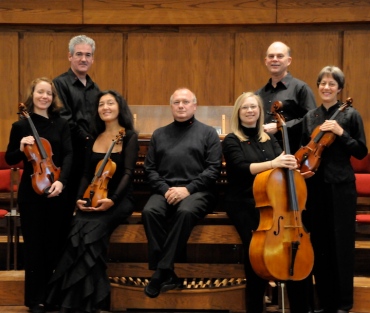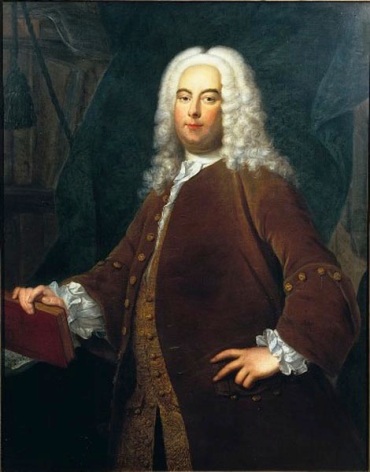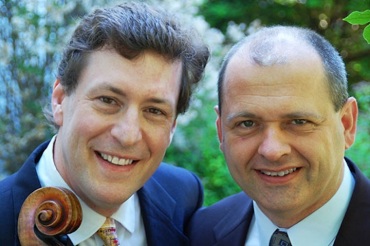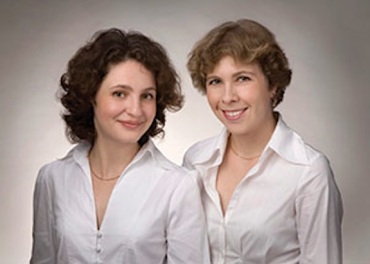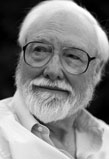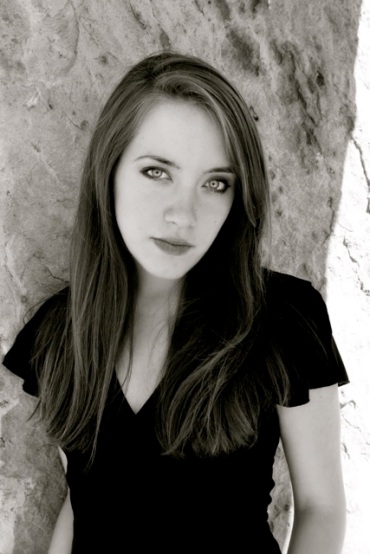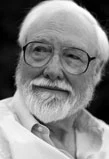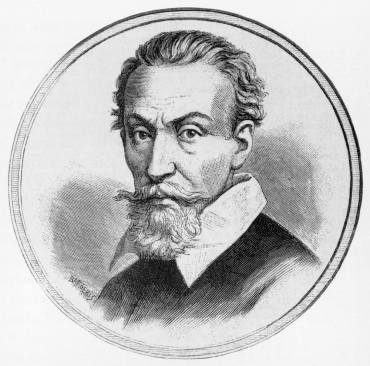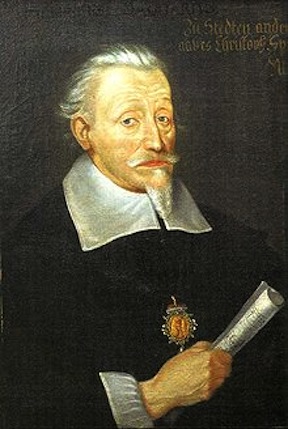The Well-Tempered Ear
Classical music: American composer Stephen Paulus dies at 65. The Festival Choir of Madison performed many world premieres by him and will perform the All-Night Vigil by Tchaikovsky this coming Saturday night.
4 Comments
By Jacob Stockinger
Last week brought sad news.
The prolific American composer Stephen Paulus, who lived and worked in St. Paul, Minnesota, died last week at 65. He died of complications from a stroke he suffered last year, according to his son.
Paulus was probably best known to Madison-area residents for the many works and several compositions that the Festival Choir of Madison commissioned and performed.
And talk about timing.
The Festival Choir of Madison (below) will open its new season by performing the All-Night Vigil of Pyotr Ilyich Tchaikovsky –- NOT the more famous work with the same name by Sergei Rachmaninoff –- on this coming Saturday night, November 1, at 7:30 p.m. at the First Unitarian Society of Madison, 900 University Day Drive, on Madison’s near west side.
One wonders if the group will dedicate the performance to the memory of Paulus, whose music proved both modern and accessible, and often seemed Midwestern in that Aaron Copland kind of way.
Written nearly 35 years before the more famous Vespers by Sergei Rachmaninoff, the All-Night Vigil by Tchaikovsky (below) was written in an attempt to ensure that church music in Russia retained a uniquely Russian flavor. (You can hear a sample of the Tchaikovsky work in a YouTube video at the bottom.)
The work, containing settings from three “overnight” canonical hours (Vespers, Matins and First Hour), is a beautiful representation of the Russian liturgical repertoire.
A pre-concert lecture begins at 6:30 p.m.
Tickets are $15 for the general public; $12 for seniors; and $9 for students.
Here is a link with information and reservations:
http://festivalchoirmadison.org/Season1415/tickets.htm
And here is more about Stephen Paulus (below), whom The Ear interviewed many years ago when he was working for The Capital Times. He was the model of a cordial and gracious artist who cared deeply about the public’s ability to appreciate his work.
Here is an obituary that appeared in The New York Times:
And here is a story that appeared on Minneapolis Public Radio, which, like Wisconsin Public Radio, emphasizes classical music when many affiliates of NPR (National Public Radio) are increasingly turning to talk radio.
http://www.mprnews.org/story/2014/10/20/stephen-paulus-a-musical-life
Tags: All-Night Vigil, Arts, Capital Times, choral music, chorus, Classical music, Festival Choir of Madison, First Unitarian Society of Madison, Jacob Stockinger, liturgical music, liturgy, Madison, matins, Minnesota, Minnesota Public Radio, Music, New York Times, NPR, Rachmaninoff, Russian music, Sergei Rachmaninoff, St. Paul, Stephen Paulus, Tchaikovsky, vespers, vigil, wisconsin public radio, YouTube
Classical music: You Must Hear This -– the Romance for Viola and Orchestra by Max Bruch.
5 Comments
By Jacob Stockinger
I saw and heard Madison-born and Madison-raised violist Vicki Powell (below) last Wednesday night. That was when the alumna of the Wisconsin Youth Symphony Orchestras (WYSO), the UW-Madison School of Music, the Juilliard School and the Curtis Institute who now plays with the New York Philharmonic and other prestigious groups and who has participated in the Marlboro and Aspen festivals, returned from New York City to solo with the Middleton Community Orchestra.
It was a wonderful and thoroughly enjoyable performance as well as very affordable event, as you can read in the review by John W. Barker that was posted yesterday.
Here is a link:
After the concert done in the terrific 90-minute, no intermission format that I think attracts many people, there was a meet-and-greet, with cookies and punch, where the public and the musicians could mingle – and did.
That’s when I went up to the lovely, gifted and poised Vicki Powell and remarked on how beautiful her playing had been with the MCO under conductor Steve Kurr (below top). I was quite taken with her reading of the rarely heard Fantasy on Themes by Mozart for Viola and Orchestra by Johann Nepomuk Hummel (below bottom).
Hummel remains a much underappeciated composer who was invited by none other than Wolfgang Amadeus Mozart himself to live in his house and take free lessons.
But what really swept me away was the Romance for Viola and Orchestra by the 19th-century Romantic German composer Max Bruch (below).
I have heard Max Bruch’s popular violin concertos – especially No. 1 in G minor — and his Kol Nidre for cello and piano as well as his Scottish Fantasy for violin and orchestra.
But this work was completely new and unknown to me, but captivated me from the first notes. No 10 listenings or more needed to like and appreciate this work!
“I am amazed it hasn’t yet been used for a movie soundtrack,” I said to Powell.
“Really?” she said. “So am I.”
That is how beautiful and tuneful, how accessible and emotional, it is.
And maybe you will be surprised too.
So here is a YouTube video of the work performed by violist Miles Hoffman, who also comments frequently on classical music for NPR (National Public Radio). It lasts about 9-1/2 minutes and is pure loveliness.
And maybe it has indeed been used in the movies.
If so and you know, please let us know.
And let us know what you think of the piece, which The Ear thinks deserves to be programmed much more often, even though the viola is not often featured as a solo instrument with orchestra. (All the more reason to admire the Middleton Community Orchestra and its mission.)
The Ear wants to hear.
Tags: Arts, Aspen Festival, Chamber music, Classical music, Hummel, Jacob Stockinger, Juilliard School, Kol Nidre, Madison, Marlboro Festival, Max Bruch, Middleton Community Orchestra, Mozart, Music, New York City, New York Philharmonic, Orchestra, Scottish Fantasy, University of Wisconsin-Madison School of Music, University of Wisconsin–Madison, Vicki Powell, Viola, Violin, Wisconsin Youth Symphony Orchestras, Wolfgang Amadeus Mozart, WYSO, YouTube
Classical music: The Middleton Community Orchestra opens its season with polished viola playing from Vicki Powell and infectious enthusiasm from the entire orchestra in a Dvorak symphony.
1 Comment
By Jacob Stockinger
Here is a special posting, a review written by frequent guest critic and writer for this blog, John W. Barker. Barker (below) is an emeritus professor of Medieval history at the University of Wisconsin-Madison. He also is a well-known classical music critic who writes for Isthmus and the American Record Guide, and who for 20 years hosted an early music show every other Sunday morning on WORT FM 89.9 FM. He serves on the Board of Advisors for the Madison Early Music Festival and frequently gives pre-concert lectures in Madison.
By John W. Barker
The Middleton Community Orchestra (below) opened its fifth season on last Wednesday evening with a mix of novelties and old favorites.
The orchestra’s new concertmaster, Valerie Clare Sanders, a senior at the UW-Madison School of Music who also plays with the Madison Symphony Orchestra, also made her debut with the MCO.
The starter was the ever-popular, ever-rousing Overture to the opera “William Tell” by Rossini. The playing seemed a little less fully digested, but the piece still came off with spirit.
The unfamiliar elements were two display pieces for the young but highly gifted, Madison-born violist, Vicki Powell (below). She offered a superbly warm, rich, clearly projected tone, presented in a thoroughly professional manner— reminding us, too, how underappreciated the viola is as a solo instrument.
Her first selection was a Fantasia on themes of Mozart, by Johann Nepomuk Hummel (1778-1837), a protégé of Mozart and rival to Beethoven. Originally a solo piano piece of 1833, if I am not mistaken, it was arranged for solo viola and chamber orchestra by the French musician Fernand Oubradous. It proved to be charming music, beautifully played.
The second piece was a Romance, Op. 85, of 1911, for viola and orchestra. Composed in lush late-Romantic style, it could have been a movement of a concerto, and was a handsome dialogue between soloist and orchestra, realized with particularly gorgeous tone by Powell. She is a musician to watch for.
The grand finale was the Symphony No. 8 in G major by Antonin Dvorak.
Here I must ask the reader’s patience if I indulge in a strong personal memory about this work — and a very pertinent one.
When I was a graduate student in the late 1950s at Rutgers University, in New Brunswick N.J., I attended a concert by the New Brunswick Community Philharmonic (if I remember its name correctly). It consisted of semi-professionals and amateurs of the area, under the baton of the local high-school bandmaster, one Max Pecker. This has proven to be one of the most memorable concerts of my musical lifetime, and I still recall the program vividly.
Franz Schubert’s bouncy Overture to his opera “Alfonso und Estrella” immediately revealed that this orchestra was a pretty scrappy affair in terms of discipline. BUT: the players were having so much fun in their work that it was impossible not to share their enthusiasm.
The second work was the Piano Concerto No. 2 of Camille Saint-Saëns, featuring a local keyboard whiz just back from the Paris Conservatory. For him the orchestra had made its most careful preparation, and their playing came off as quite credible.
But the final work was this very same G major Symphony by Dvorak (below). Now, the orchestra’s concertmaster was also the local newspaper’s music critic (!), and in her review of the concert she revealed the profundity of her knowledge by observing that, though this symphony was not as well-known as Dvorak’s Symphony No 9 “The New World,” it was, she insisted, “not without moments of interest” (! again). (You can hear the entrancing and beautiful symphony in a YouTube video at the bottom.)
The important thing was that, even though the work was rough going for this ensemble, the sheer joy of the players was simply contagious. The most honest kind of musical pleasure filled the hall. As I said, this is a concert I have never forgotten, always remembered affectionately.
I had that concert very much in mind in listening to the MCO performance.
Oh yes, there were some passing fluffs here and there. But this was an orchestra that could play with discipline and coherent unity of purpose, far beyond the New Brunswickers’ capacities. The parallel was, however, that the players seemed clearly to have caught the enthusiasm for the score conveyed to them by conductor Steve Kurr (below).
Better than most performances I have heard, Kurr projected an intensity and even dramatic emphases that the orchestra took up and gave back to him gloriously.
One member told me afterwards: “We enjoyed playing it.” And I found myself at times transported with delight at how this magnificent score once again came alive for me, thanks to music-making that was more than just a matter of artistic efficiency.
My point is not just a matter of nostalgia revived. It is a reminder that one does not have to have a performance by one of the super-polished orchestras of our Big Cities, or of the international world, in order to have a memorable listening experience.
A deeply committed orchestra under inspired and inspiring leadership can offer as satisfying a musical experience as can be found anywhere.
Madison audiences should therefore listen up and pay attention to Middleton’s really splendid community orchestra, taking advantage of its offerings to discover the genuine rewards.
Tags: American Record Guide, Antonín Dvořák, Arts, Camille Saint-Saëns, Classical music, concerto, Early music, fantasy, Fernand Oubradous, Franz Schubert, Hummel, Jacob Stockinger, Johann Nepomuk Hummel, Madison, Madison Symphony Orchestra, Max Bruch, Middleton Community Orchestra, Orchestra, Overture, Piano, Romance, Romantic, Rossini, Rutgers University, Steve Kurr, University of Wisconsin-Madison School of Music, University of Wisconsin–Madison, Vicki Powell, Viola, Violin, Willliam Tell, YouTube
Classical music: Are super-high concert fees morally right or wrong? Do they contribute to the wealth gap and lack of young audiences? What can music consumers do?
22 Comments
By Jacob Stockinger
Are artist concert fees — like those charged by tenor Placido Domingo (below top), soprano Renee Fleming (below middle) and violinist Itzhak Perlman (below bottom) — too high these days and too unaffordable for most American concert-goers?
What would Janet say?
Maybe that refrain could become the economic equivalent of What Would Jesus Say?
I am speaking of Janet Yellen (below), the chairwoman of the Federal Reserve who last week made headlines when she spoke out publicly against the widening wealth gap as being contrary to America’s historic democratic ideals.
But let’s localize the issue.
By all accounts superstar cellist Yo-Yo Ma, along with pianist Kathryn Stott, turned in a terrific performance — his seventh — at the Wisconsin Union Theater last Saturday night.
The Ear didn’t go, but here is a rave review from the student newspaper The Badger Herald, which agrees with the word-of-mouth reviews I have heard:
And for those who couldn’t or wouldn’t buy tickets, the Wisconsin Union Theater even webcast the concert live and for free.
Still, with seats that sold for well over $100, The Ear got to wondering: Are really high artist fees morally right or wrong?
We all hear about the widening wealth gap, and especially about the astronomical pay given to CEOs versus their workers as compared to the same ratio several decades ago.
Well, what about well-known and in-demand concert artists?
If The Ear heard correctly, Yo-Yo Ma’s fee for that one-night performance was either $90,000 or $95,000 -– or about $42,500 or $45,000 an hour.
Can Yo-Yo Ma demand and get that extravagant fee in the so-called “free market” society with its corporate welfare and tax loopholes for the wealthy? Of course, he can — and he does. That is why he sold out the Wisconsin Union Theater.
But should he?
It makes one wonder.
Is Yo-Yo Ma really that much better as a cellist and musician -– and not just as a celebrity — than many other cellists, including MacArthur “genius grant” winner Alisa Weilerstein, Alban Gerhardt, Jean-Guihen Queyras, Steven Isserlis, Carter Brey, Joshua Roman and others? (You can hear Yo-Yo Ma’s interpretation of a movement from a solo cello suite by Johann Sebastian Bach in a YouTube video — with over 11 million hits — at the bottom and decide if it is that much better than other cellists play it.)
Now I don’t mean to pick just on Yo-Yo Ma. I have gone to a half-dozen of his other performances here and I have met him and talked with him. He is without doubt a great musician, a fine human being and an exemplary humanitarian.
The problem that I am talking about transcends any single performer and applies to the whole profession.
Maybe at least part of the problem of attracting young audiences to classical music concerts can be placed right in the laps of the performing artists themselves.
When The Ear was young, he got to hear all sorts of great musical artists—including Leonard Bernstein, Arthur Rubinstein (below), Vladimir Horowitz, Van Cliburn, Itzhak Perlman, Rudolf Serkin, Isaac Stern, Emanuel Ax and others for quite affordable prices. Not that those artists didn’t live well -– but I doubt that they were paid the equivalent of $45,000 an hour.
Maybe it is time for economic populism in the performing arts.
Fees like that exclude a lot of families from participating. Some fans might find it better and cheaper to hear a CD or download than go to a live concert.
Too many performing artists – opera stars come immediately to mind as a class — seem to have taken the same path toward justifying greed as movie stars, sports figures, rock stars and CEO’s who make out like bandits.
In short, can it be that classical musicians are helping to kill off classical music?
Smaller theaters like the Wisconsin Union Theater and even the Overture Center simply cannot book such well-known artists without charging a ridiculous amount of money for a seat – and at a time when many people of all ages just can’t afford it. It just adds to the Wealth Gap and the One Percent problem.
SO THE EAR WOULD LIKE TO ASK CONCERT ARTISTS: PLEASE ADJUST YOUR CONCERT FEES TO HELP SUSTAIN THE FUTURE OF YOUR ART.
Well, these are just some brain droppings.
The Ear wonders what you think of stratospheric artist fees?
Do they contribute to the wealth gap?
Do they hurt the popularity of the art form, especially younger generations?
Are they contributing to the decline of cultural literacy?
In short, are such high artist fees morally right or wrong?
And if wrong, what can we arts consumers do about it? Boycott certain artists until they become more reasonable in their fees?
Ask artist and management agencies to adjust the fees to make them more affordable?
Go to alternative concerts that are perfectly acceptable without star power and cost less or, like those at the University of Wisconsin School of Music, free?
Tell us what you think in a COMMENT.
The Ear wants to hear.
Tags: Alban Gerhardt, Alisa Weilerstein, Arthur Rubinstein, Arts, Bach, Badger Herald, Carter Brey, Cello, Chamber music, Classical music, Compact Disc, Concert, concert fee, Emanuel Ax, Federal Reserve, genius grant, Income Disparity, Isaac Stern, Itzhak Perlman, Jacob Stockinger, Janet Yellen, Janet Yellin, Johann Sebastian Bach, Joshua Roman, Kathryn Stott, Leonard Bernstein, MacArthur Foundation, opera, Orchestra, Overture Center, Piano, Renée Fleming, Rudolf Serkin, Saturday, solo cello suite, Steven Isserlis, Suite, United States, University of Wisconsin-Madison School of Music, University of Wisconsin–Madison, Van Cliburn, Violin, Vladimir Horowitz, Wealth Gap, Wisconsin Union Theater, Yo-Yo Ma, YouTube
Classical music: Two percussion concerts — by Clocks in Motion and Madison native Nathaniel Bartlett — take place on Sunday afternoon. This week’s FREE Friday Noon Musicale features vocal music by many composers.
3 Comments
ALERT: This Friday’s FREE Noon Musicale, from 12:15 to 1 p.m. at the First Unitarian Society of Madison, 900 University Bay Drive, features Rachel Eve Holmes (below), soprano; Christopher Apfelbach, baritone and Michael Keller, piano, in the music of Carlisle Floyd, Reynaldo Hahn, Amy Beach, Richard Strauss, Benjamin Britten, Gabriel Faure, Paul Bowles and Wolfgang Amadeus Mozart.
By Jacob Stockinger
As I wrote and posted on Monday and Tuesday, Friday night is a major “train wreck” of competing concerts.
But Sunday is busy also and brings potential conflicts, particularly for percussion fans, though there is time to get from one concert to the other.
CLOCKS IN MOTION
On Sunday at NOON — NOT 1 p.m. as previously stated — in Mills Hall on the University of Wisconsin-Madison campus, the percussion group Clocks in Motion (below), will give a FREE concert. The program features world premieres as well as music by Frank Zappa, Edgard Varèse and John Cage. (Free parking is available on Sundays in nearby Grainger Hall in the basement of the UW-Madison Business School.)
Here is a press release from the group, which includes Dave Alcorn, Jennifer Hedstrom, Sean Kleve, Michael Koszewski and James McKenzie:
“Contemporary chamber ensemble Clocks in Motion blends the classical concert hall with the rock n’ roll venue in a bold performance on Sunday afternoon, Oct. 26, at 1 p.m. in Mills Hall.
The program will pair one of the first pieces written for percussion ensemble with music by iconoclast Frank Zappa.
Zappa listed Edgard Varèse’s groundbreaking work, Ionisation, as one of his fundamental inspirations in becoming a composer.
Clocks will juxtapose this influential piece with Zappa’s Black Page, a drum solo that was later expanded to a full-band tune. Black Page’s uniquely virtuosic sound blends rock, contemporary, and experimental avant-garde music.
Guitarist Anthony Lanman joins the program as a guest performer on the world premiere of his 8-string electric guitar concerto, Automaton.
A lush quartet for mallet percussion, piano, and cello by Joseph Diedrich will also receive its world premiere.
Rounding out the program is John Cage’s Second Construction, a grooving classic in the percussion literature.
Here are more specifics about the program:
Ionisation: Although it is only 5 minutes long, Edgard Varèse’s seminal percussion piece laid the groundwork for 90-plus years of composition for the genre (and beyond, as displayed by Frank Zappa). Varèse (below) explores the coloristic possibilities of percussion with unique instruments including drums, woodblocks, sirens, cymbals, chimes, maracas, slapsticks, and more.
Black Page: Originally constructed as a drum solo in a style unique to Frank Zappa (below), Black Page is known for its impressive rhythmic complexity and polyrhythms. This meticulous, thrilling piece is in two parts: No. 1, a full-ensemble percussion unison featuring a “statistical density”; and No. 2, the “Easy Teenage New York Version,” which grooves through the same material with a full band.
Automaton: Says Anthony Lanman (below): “When Clocks in Motion asked me to write a piece for them, immediately their name set off a series of images in my head. I saw a lonely watchmaker — an unappreciated genius — who had a vision in his mind of a great automaton. I saw him slaving away in his workshop, creating the massive creature, and then, finally, releasing it (with the best of intentions) upon the world. Unfortunately, the automaton didn’t function as planned…
“This all broke down into a concerto for electric guitar and percussion, and was organized into three movements: I. Watchmaker’s Daydream – II. Workshop/Steam – III. …In Motion.”
Saturation: Writes Joseph Diedrich: Composed in 2013, Saturation combines the distinct timbral subtleties of mallet percussion, strings, and piano. Using UW-Madison composer Stephen Dembski’s constellation protocol, the piece embarks on an evolutionary journey, culminating in the discovery of tonality. Starting with distant, sparse reverberations, Saturation quickly becomes a wild musical adventure.
Second Construction: The 1940 work by John Cage (below) is scored for four players, and features piano prepared with cardboard, screws, and a metal cylinder carefully placed inside the instrument. The instrumentation is fascinating — water gong, temple bowls, almglocken, maracas and tam-tam are heard.
New music, new instruments and new sounds define Clocks in Motion’s fresh and innovative approach to contemporary classical performance. Hailed as “nothing short of remarkable” (ClevelandClassical.com), Clocks in Motion is a group that performs new music, builds its own instruments and breaks down the boundaries of the traditional concert program. Clocks in Motion consistently performs groundbreaking concerts involving performance art, theater, and computer technology.
Featuring world premieres alongside rarely performed classic works, this ensemble strives to create a new canon of percussion repertoire. You can hear how they make music on found objects in a YouTube video at the bottom.
Clocks in Motion works passionately to educate young audiences through master classes, residencies, presentations and school assemblies.
The ensemble’s unique skill sets and specialties contain an impressive mix of rock, jazz, contemporary classical, orchestral, marching and world styles.
Clocks in Motion has served as resident performers and educators at the Interlochen Arts Academy, Casper College, the University of Michigan, Baldwin-Wallace University, VIBES Fine and Performing Arts, Traverse City West High School, Traverse City East Middle School, Rhapsody Arts Center, and the Madison Museum of Contemporary Art. Formed in 2011, Clocks in Motion began as an extension of the University of Wisconsin-Madison’s Graduate Percussion Group, and now serves as the affiliate ensemble of the UW-Madison percussion studio.
NATHANIEL BARTLETT
At 6:30 p.m. in Promenade Hall of Overture Hall, the Madison-born percussionist and marimba-player Nathaniel Bartlett (below), who uses complex computer technology in his music, will perform an unusual concert.
Tickets are $16.
Here is a link to the full description of the artist and the concert:
http://www.overturecenter.org/events/nathaniel-bartlett
Tags: Amy Beach, Arts, Baldwin-Wallace University, Benjamin Britten, Britten, Carlisle Floyd, Casper College, Chamber music, Classical music, Clock, Edgard Varèse, Faure, First Unitarian Society of Madison, Frank Zappa, Jacob Stockinger, John Cage, Madison, Mozart, Music, Paul Bowles, Performing arts, Reynaldo Hahn, Richard Strauss, Sunday, University of Wisconsin-Madison School of Music, University of Wisconsin–Madison, Wolfgang Amadeus Mozart, YouTube



